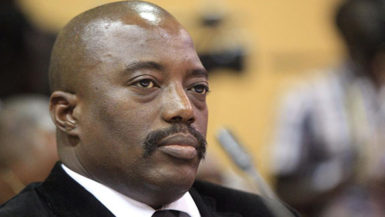KINSHASA (Reuters) – Congolese police yesterday clashed with protesters marching against what they claim is a bid by President Joseph Kabila to extend his mandate, killing at least 17 people and prompting a threat of further sanctions from the United States.
The protest, attended by thousands, came at a time of growing local and international pressure on Kabila to step down when his term of office legally ends in December.
The opposition accuses him of plotting to extend his tenure in the central African copper producer by delaying elections that were supposed to be held in November until at least next year. His supporters deny this.
“The sad and painful death toll from these barbaric and extremely savage acts is as follows: 17 dead of which three were policemen,” said Interior Minister Evariste Boshab, condemning “the use of violence to incite disorder and chaos”.

United Nations Secretary-General Ban Ki-moon confirmed the death toll and urged Congolese national security forces to exercise restraint.
The president of opposition party Reformist Forces for Union and Solidarity (FONUS) Joseph Olenga Nkoy said 53 people were killed in the clashes while a local rights official said 25 protesters were shot.
Earlier yesterday, a Reuters witness saw a crowd burning the body of a police officer in the Kinshasa suburb of Limete in an apparent act of retaliation for police gunfire.
Angry crowds torched the offices of politicians loyal to Kabila and tore down giant posters of the president, chanting in French: “It’s over for you” and “We don’t want you”.
Rights groups reported dozens of arrests of protesters and journalists in the capital as well as in Goma and Kisangani, where anti-government marches also took place.
A government spokesman confirmed the detention of opposition leader Martin Fayulu, who suffered a head injury during the march.
By mid-afternoon, most protesters had been dispersed and the streets in the normally bustling city centre were quiet.
But in a sign that further unrest could be ahead, opposition leader Etienne Tshisekedi called for further protests in a statement late yesterday.
“(The opposition coalition) calls upon the Congolese population from this day forth to intensify and amplify the popular mobilisation every day until December 19,” said a spokesman for Tshisekedi’s UDPS party, referring to the day Kabila is officially due to step down.
Kabila’s supporters also plan a loyalty march this weekend, according to a statement released on Sunday.
Yesterday’s march was sparked by anger over a decision by the election commission last week to petition the constitutional court to postpone the next presidential vote.
The vast, mineral-rich central African state has never seen a peaceful transition of power. Western observers and donors fear that growing political instability could mushroom into armed conflict in a country plagued by militias, especially in its lawless eastern regions.
Millions of people died in regional wars in Congo between 1996 and 2003 that drew in armies from half a dozen countries.
The United States yesterday threatened to impose additional sanctions on those responsible for violence and repression — an outcome Kabila is seeking to avoid.
It imposed targeted sanctions on a Kinshasa police chief in June. Dozens of people died in similar protests against Kabila last year.
Police said in a statement that officers had been warned to use restraint ahead of yesterday’s march, adding that it would punish those who did not comply. But Human Rights Watch said government repression has intensified in the period leading up to the clash.
“Today’s march shows that the security forces have not switched their tactics and are still clamping down on anyone opposed to Kabila,” said Ida Sawyer, senior researcher at Human Rights Watch. She added that three children were shot in Goma during the clashes.
In another sign of growing scrutiny of Kabila’s government, French Foreign Minister Jean-Marc Ayrault yesterday described the situation in Congo as “extremely worrying and very dangerous”, adding that European nations will discuss the possibility of imposing sanctions.
The African Union urged parties in Congo to seek a solution to the current political impasse through talks.
In a further sign of growing tensions between Washington and Kinshasa, the US embassy said on its Twitter feed that it was “outraged” by the harassment of its special envoy for the Great Lakes Region of Africa, Thomas Perriello, at Kinshasa’s airport.
Congo’s “Presidential Majority”, as Kabila’s supporters call themselves, had accused Perriello, in a Sunday statement, of jeopardising talks aimed at resolving the political impasse.




